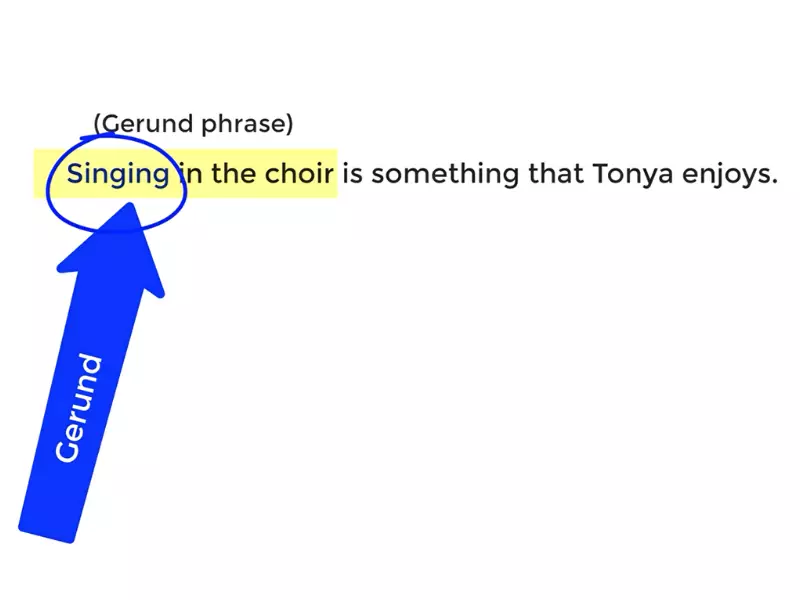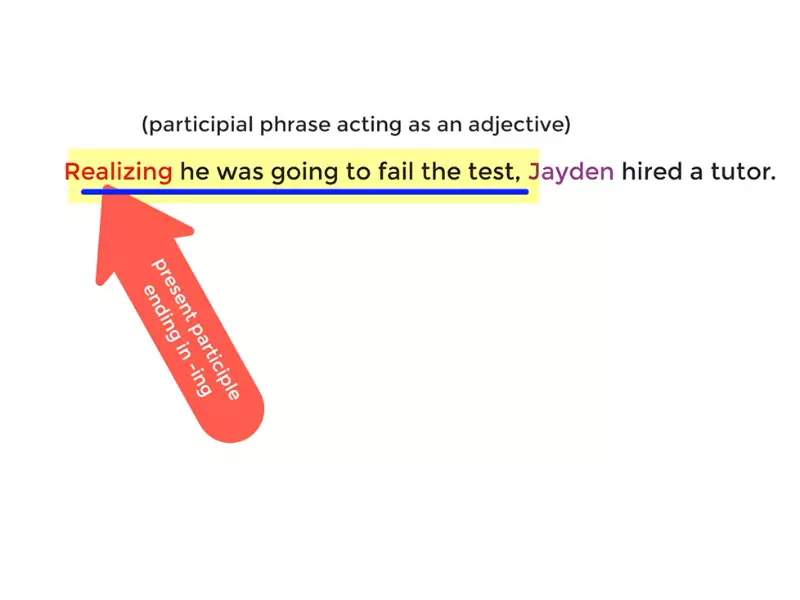The intricacies of English grammar often present a fascinating puzzle to both learners and fluent speakers alike. Among the elements that frequently cause confusion are gerunds and participles, two forms of verbs that serve different functions within a sentence. Despite their similar appearances, understanding their distinctions is crucial for accurate and effective communication.
Gerunds are verbs that act as nouns, ending in -ing, and play a pivotal role in conveying actions as subjects or objects in sentences. Participles, on the other hand, can be present or past forms of verbs, ending in -ing, -ed, or other patterns, and function as adjectives to modify nouns or pronouns. This fundamental difference in function highlights the unique roles gerunds and participles play in sentence construction.
Recognizing the difference between a gerund and a participle involves observing their usage in a sentence. While a gerund might be involved in naming an activity or serving as the subject or object, a participle often describes a state or quality of a noun. Understanding these distinctions not only enhances one’s grasp of grammar but also polishes writing skills, making it easier to convey complex ideas clearly and effectively.

Gerund Basics
Definition
A gerund is a verb form that ends in -ing and functions as a noun within a sentence. This unique feature allows it to take on roles typically reserved for nouns, such as being the subject, object, or complement in a sentence. For example, in the sentence “Running is enjoyable,” “running” is a gerund acting as the subject.
Formation
Gerunds are formed by adding -ing to the base form of a verb. This transformation turns the action described by the verb into a noun-like entity. The process is straightforward:
- Take the base form of the verb (e.g., “run”).
- Add -ing to the end (e.g., “running”).
This simple alteration shifts the word from expressing an action to naming the action as a concept or activity.
Usage
Gerunds can be used in various parts of a sentence:
- As the subject: “Swimming is fun.”
- As a direct object: “I enjoy swimming.”
- As a subject complement: “My favorite activity is swimming.”
- After prepositions: “She is good at swimming.”
These examples highlight the versatility and utility of gerunds in expressing ideas succinctly and effectively.
Participle Basics
Definition
A participle is a form of a verb that functions as an adjective, modifying nouns or pronouns. There are two main types: present participles and past participles. Participles are essential for adding descriptive detail to sentences, offering a concise way to convey actions or states related to the nouns they modify.
Types
- Present participles: End in -ing and describe ongoing actions or states. Example: “The running water.”
- Past participles: Often end in -ed, -d, -t, -en, or -n, describing completed actions or states. Example: “The broken glass.”
These variations allow for a rich expression of time and aspect in relation to nouns.
Usage
Participles can enhance sentences by providing additional information about nouns or pronouns:
- Modifying nouns: “The barking dog kept me awake.”
- As part of the verb tense: “She has finished her work.”
- In passive constructions: “The book was written by her.”
These roles demonstrate the adaptability of participles in crafting detailed and nuanced sentences.
Key Differences
Function in a Sentence
The primary distinction between gerunds and participles lies in their function:
- Gerunds act as nouns, naming activities or concepts.
- Participles serve as adjectives, describing or modifying nouns and pronouns.
Understanding this difference is crucial for correctly using each form in various sentence structures.
Ending Patterns
While both gerunds and present participles end in -ing, their function in a sentence helps distinguish them:
- Gerunds: Always function as nouns, regardless of their placement.
- Participles: Function as adjectives, even when sharing the same -ing ending.
This similarity in form but difference in function underscores the importance of context in grammar.
Position and Role
Their positions in sentences also help identify gerunds and participles:
- Gerunds can occupy positions typical for nouns, such as subjects, objects, or complements.
- Participles, as adjectives, typically precede the nouns they modify or are part of the verb phrase, indicating tense or mood.
Recognizing these positions and roles further clarifies the distinctions between gerunds and participles, enhancing both understanding and application in writing.

Common Confusions
Verbal Nouns vs. Gerunds
Verbal nouns and gerunds often cause confusion due to their similar -ing form. However, a clear distinction exists between them:
- Verbal nouns do not take objects or modifiers related to the verb. They function strictly as nouns without retaining any verbal properties. For instance, “The painting is beautiful” refers to a piece of art, with “painting” acting solely as a noun.
- Gerunds, on the other hand, retain a verb-like quality, allowing them to take objects and be modified by adverbs. “Painting landscapes is relaxing” features “painting” as a gerund, where it functions as a noun but also implies the action of painting.
Understanding this distinction helps clarify when an -ing word is expressing action (gerund) versus when it’s merely naming something (verbal noun).
Participles as Adjectives and Verbs
Participles serve a dual role in English grammar, acting as both adjectives and parts of verb tenses:
- When functioning as adjectives, participles modify nouns or pronouns, providing more detail about them. For example, “The running water” uses “running” as an adjective to describe “water.”
- As part of verb tenses, particularly the perfect and progressive aspects, participles help express the time and state of the action. “She is running” (present participle) and “She has run” (past participle) demonstrate these uses.
Recognizing the dual nature of participles enhances understanding of their versatility in sentence construction.
Practical Examples
Sentences with Gerunds
Gerunds can enrich sentences by focusing on actions as concepts. Here are examples showcasing their effective use:
- As subjects: “Reading enlightens the mind.”
- As objects: “They enjoy hiking.”
- As complement: “Her passion is baking.”
- After prepositions: “He apologized for arriving late.”
These instances highlight gerunds’ ability to convey actions in a noun form, adding depth to sentence structures.
Sentences with Participles
Participles enhance descriptions and indicate time aspects. Below are sentences utilizing participles correctly:
- As adjectives: “The broken vase was irreplaceable.”
- Forming verb tenses: “They have finished their work.”
- In passive voice: “The letter was written by him.”
Through these roles, participles provide detailed imagery and temporal context within sentences.
Tips for Identification
Quick Identification Tips
To quickly identify gerunds and participles in sentences, consider these tips:
- Gerunds:
- Function as nouns.
- Can often be replaced with a pronoun without losing sentence integrity.
- Are sometimes preceded by prepositions.
- Participles:
- Serve as adjectives or part of verb phrases.
- Modify nouns or express verb tense and aspect.
- Present participles always end in -ing; past participles vary in ending (-ed, -d, -t, -en, -n).
Applying these tips can facilitate the quick differentiation between gerunds and participles, aiding in their correct usage.
Practice Exercises
Suggestion of Exercises
To master distinguishing between gerunds and participles, try these exercises:
- Identification: Given a list of sentences, identify whether the -ing word is a gerund or a participle.
- Sentence creation: Write sentences using a specific verb as both a gerund and a participle, highlighting their different functions.
- Transformation: Convert sentences with gerunds into ones with participles, and vice versa, noting the change in meaning or function.
- Comprehension questions: Answer questions about a short text that uses both gerunds and participles, focusing on their roles and effects.
Practicing these exercises regularly will enhance your ability to differentiate between gerunds and participles, improving both comprehension and writing skills.
Frequently Asked Questions
What is a Gerund?
A gerund is a verb form that ends in -ing and functions as a noun in a sentence. It can serve as the subject, object, or complement, effectively turning an action into a concept or activity. For example, in the sentence “Swimming is my favorite hobby,” “swimming” is a gerund acting as the subject.
What is a Participle?
A participle is a form of a verb that acts as an adjective to modify nouns or pronouns. There are two types: present participles, ending in -ing, and past participles, typically ending in -ed or -en. For instance, “The running water” uses a present participle to describe the water.
How Can I Distinguish Between a Gerund and a Participle?
To distinguish between a gerund and a participle, look at the role the word plays in the sentence. If it’s acting as a noun, it’s a gerund. If it’s modifying a noun or pronoun, it’s a participle. Context is key; consider whether the word is naming an activity or describing a state or characteristic.
Why is Understanding Gerunds and Participles Important?
Understanding gerunds and participles is crucial for effective communication and writing. It allows for the precise expression of ideas and actions, enabling writers and speakers to construct sentences that accurately convey their intended meanings. Mastery of these concepts also aids in achieving fluency and sophistication in English.
Conclusion
Mastering the differences between gerunds and participles is a stepping stone to advanced proficiency in English grammar. It not only clarifies how actions and descriptions interplay within sentences but also enhances one’s ability to craft messages with precision and creativity. As subtle as these distinctions may seem, they are pivotal in the nuanced task of sentence construction.
The journey through the landscapes of gerunds and participles enriches one’s understanding of English, opening up new avenues for expression. Whether in writing or in speech, the ability to correctly employ these forms significantly contributes to the clarity and depth of communication, embodying the art and science of language in its full glory.
